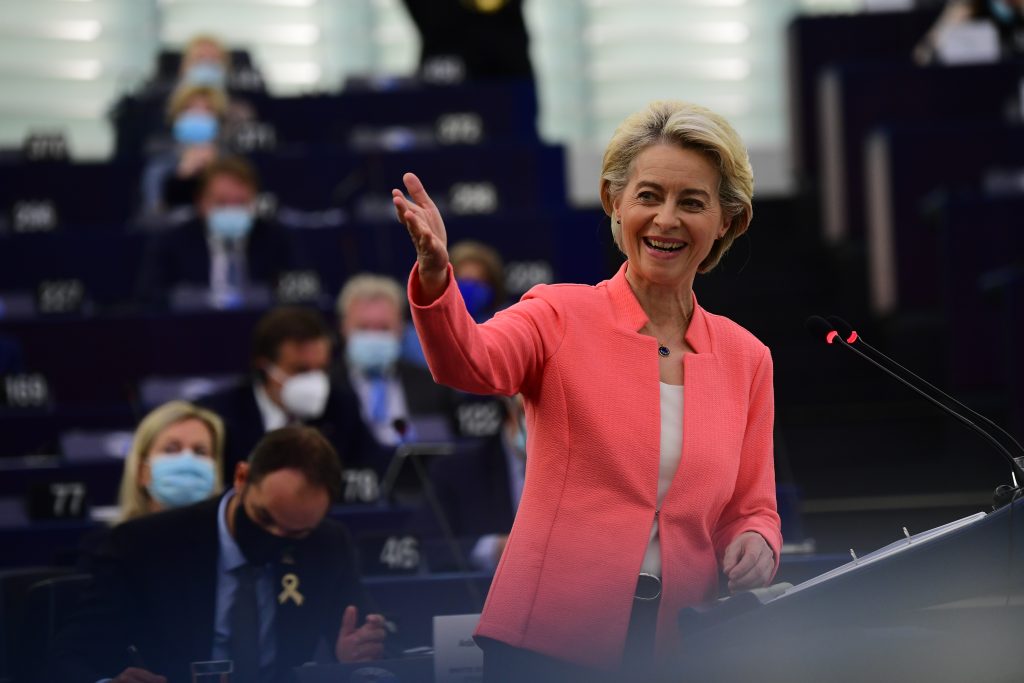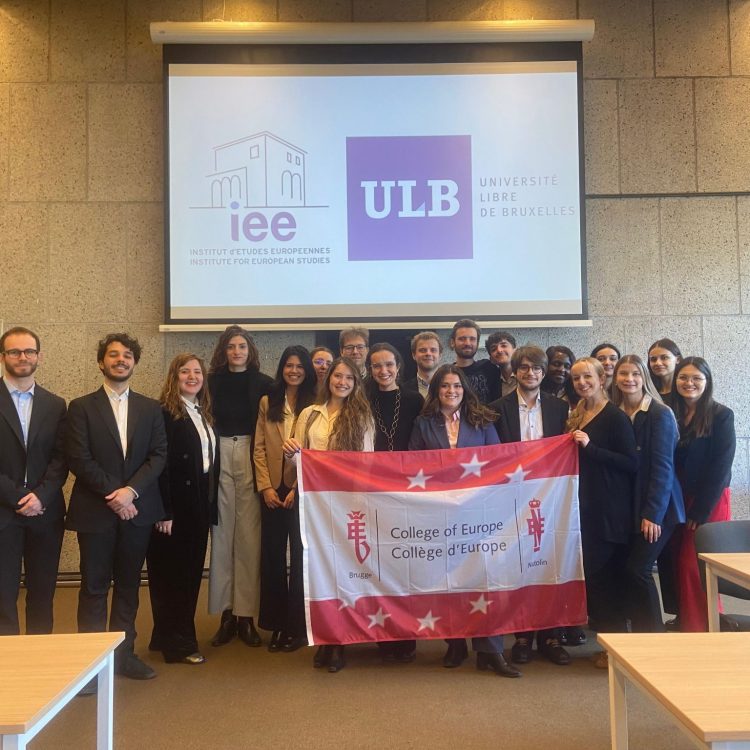European Commission President, Ursula von der Leyen delivered, on September 15th, her second State of the Union speech. Focusing on the COVID-19 pandemic and the recovery plans, the challenges of global warming and climate change, the work on the Digital Union, the need for a European Defence Union and the defence of European values such as freedom of speech and freedom of the press, the presence of the EU in international affairs and its role in the world was less prominent in #SOTEU21 .
Two of the IEE-ULB’s scientific collaborators, Dr. Syuzanna Vasilyan and Dr. Frank Mattheis reflect briefly on #SOTEU21’s messages concerning the Eastern neighbourhood, the Mediterranean and the African Union.
Ursula von der Leyen’s State of the Union 2021
To read Von der Leyen’s full speech please click below:
SOTEU 2021: Unjustified Lethargy of the EU’s “Moral Power”

Dr. Syuzanna Vasilyan is Research Fellow at the Universite libre de Bruxelles, Belgium (since 2015) where she is also scientific collaborator at the IEE-ULB. She was Visiting Professor at Sciences Po Paris, France (2016), Assistant Professor and Jean Monnet Chair of European Studies at the American University of Armenia (2011-2015), Visiting Professor at Central European University, Hungary (2010-2011), and Visiting Researcher at the European University Institute, Italy (2009-2010, 2013, 2015, 2016), University of Padova, Italy (2012), Waseda University, Japan (2015), Georgetown University and University of California, Los Angeles, USA (2016).
Here’s her brief reaction to how #SOTEU21’s addressed the EU’s relationship with its neighbourhood.
State of the Union (SOTEU) 2021 marks a disconnect from SOTEU 2020 in that there is dilution of the “Eastern Partnership” and the “Union for the Mediterranean”. Moreover, the very notion of “neighbours” is both modulated politically by referring to more concrete cases, such as Belarus, and calibrated territorially by listing the Western Balkans, Turkey, the Mediterranean inferring the Southern Neighbourhood and the African Union. This entails that the EU has retreated to the traditional mode of crafting geopolitics in cooperation with the United States and in “dealing” with Russia and China.
To compare, both the Eastern Partnership and the Southern Neighbourhood were attributed equal political salience in view of the frequency of discursive use, with the Union pledging to help both with boosting their economies in 2020. In 2021 the EU’s generic intent ranges “from stepping up our engagement in the Eastern Partnership to implementing the new Agenda for the Mediterranean and continuing to work on the different aspects of our relationship with Turkey”. In the eastern neighbourhood where Ukraine and Georgia, inter alia, were stated to be cases implicating Russia’s “meddling” in 2020, the “unproductive tide” in the relations with Russia is underlined in 2021. In addition, a full paragraph focuses on Belarus and the Union’s “sticks” extended as a result of “fraudulent nature of the presidential elections” and the “forced landing… of a Ryanair jet”. Thereby, even the accentuation of specific cases insinuates a shift from the perceived success-stories (e.g. Ukraine, Georgia) to “failure”-stories (e.g. Belarus, Afghanistan).
The neglect of the other eastern partners is striking in light of the 44-day war over Nagorno-Karabakh in September-November 2020 with the military involvement of Turkey and the mediation of the cease-fire agreement between Armenia and Azerbaijan by Russia. In the southern neighbourhood, while in 2020 the EU asserted its determination to work in concert with the UN to “find long-term solutions” to the conflicts in Libya and Syria, which would be in tune with “effective multilateralism” heralded in the European Security Strategy of 2003, in 2021 the EU mentions Libya on a par with others in the context of imposition of sanctions due to human rights violations, and Syria is heeded solely because of the refugees. This signals strategic backtracking from the self-driven normative agenda to pursue “principled pragmatism”, as pledged in its Global Strategy adopted in 2016, via preference for pragmatism over principles.
SOTEU 2021 does not merely signify a reactive policy on the part of the EU but also its introversion as a polity. In an international context, which is retrogressing to a primordial predator-prey relationship, the Union’s politics of attenuation of normative objectives transpires an unjustified lethargy of its “moral power”.
SOTEU21: lost opportunity to boost a new era of EU-Africa relations?

Dr. Frank Mattheis is scientific collaborator of the IEE-ULB where he co-coordinates the Jean Monnet Project “A reassessment of relations between the EU and African regionalisms (ARREAR)”. He is a research fellow at the United Nations University – Institute on Comparative Regional Integration Studies (UNU-CRIS).
Here are his brief comments on #SOTEU21 and the place given to Africa in it.
In the brief period between Ursula von der Leyen’s inauguration and the global pandemic, Africa stood out as a priority region to engage with. Her first foreign trip was to Addis Ababa, the seat of the African Union, and only a few months later, in February 2020, she returned with an impressive cortege of 22 commissioners.
Since then, the enthusiasm for a new era of EU-Africa relations waned remarkably and this year’s SOTEU testifies that the neighbouring continent receives a second-tier status at best. Africa was barely mentioned as a partner and primarily relegated to a place for the EU to exhibit charity or a reason for a further fortified border regime.
The EU-Africa summit – scheduled for October 2020 but called off by the African side due to diverging priorities – was further kicked down the road but the Commission President assured that it would take place in February 2022 during the French EU presidency. For it to become an impactful event, Von der Leyen will have to step up to the priorities of the African Union. The SOTEU provided some potential inroads.
Africa is an evident destination for battlegroups of the European Defence Union as well as for the envisaged massive global climate and infrastructure investments. Whether this would happen on African and not just on European terms remains to be seen.
Africa played a marginal role in SOTEU21, but the EU’s climate and security ambitions will require close cooperation between the two continents.
Photo: European Union, 2021 Copyright / Source: EC – Audiovisual Service
Sources to Consult for SOTEU21: Unjustified Lethargy of the EU’s “Moral Power” by Dr. Syuzanna Vasilyan
Council of the European Union. (2003). A Secure Europe Is a Better World: European Security Strategy. Brussels: Council of the European Union.
European Commission. State of the Union 2021. Brussels, European Commission: https://ec.europa.eu/info/strategy/strategic-planning/state-union-addresses/state-union-2021_en
European Commission. State of the Union 2020. Brussels, European Commission: https://ec.europa.eu/info/strategy/strategic-planning/state-union-addresses/state-union-2020_en
European Union External Action Service. (2016). Shared Vision, Common Action, a Stronger Europe: A Global Strategy for the European Union’s Foreign and Security Policy. Brussels: European Union External Action Service.
Vasilyan, S. (2020). ‘Moral Power’ of the European Union in the South Caucasus. London and New York: Palgrave Macmillan.




